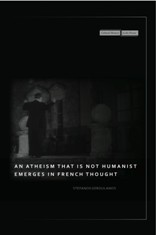In a 1956 text on ethics and literature, Emmanuel Levinas offered the following diagnosis of the philosophical trends of his…
An Atheism that Is Not Humanist

In the wake of the World Wars, major French philosophers such as Kojève, Levinas, Heidegger, Koyré, Sartre, Merleau-Ponty, and Hyppolite argued that man could no longer fill the void left by the “death of God” without also calling up the worst in human history and denigrating the dignity of the human subject. Corrupted, humanism appeared to many as an indefensible foundation of a modernity that needed to be overcome, contributing to a new belief—termed “philosophical antihumanism”—that man should no longer be viewed as the basis for existence, thought, and ethics and no longer act as the founder and guarantor of knowledge and thought.
In this book, Stefanos Geroulanos offers a history of the emergence of these intellectual developments, and argues that at their heart lay a new atheism that rejected humanism as insufficient and ultimately violent.
Antihumanism and religion
One of the things that intellectual historians show us, although often only implicitly, is the fluidity of the terms of…
Hatred and humanism
“Some of our comrades conceive this humanism as though it were a young, fair-haired girl walking through a scented meadow,…
Man dies again!
"Man dies again.” Or so might one entitle a tabloid version of Stefanos Geroulanos’s excellent work on the history of…
The poverty of atheism
Famously posing a peculiar problem of translation, names are a necessary feature of our academic craft. We like to call…
Atheism and antihumanism as intellectual-historical objects
I begin this post by posing straightaway the questions that will guide my argument. In what way can atheism and…
Catholicism, conservatism, and antihumanist politics
Geroulanos’s central thesis is compelling but simple: French antihumanism, in its theoretical mode, was based on a radicalized “negative anthropology,”…
An atheism a theologian can love
“Strangely enough,” Foucault mused, “man—the study of whom is supposed by the naïve to be the oldest investigation since Socrates—is…












